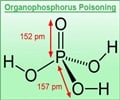Preventing brain damage in civilians and military troops exposed to poisonous chemicals, particularly those in pesticides and chemical weapons could be now possible with the results of new research.

Their work centers on proteins called phosphotriesterases, which have the unique capability of degrading chemicals in a class known as organophosphates, which are found in everything from industrial pesticides to the sarin gas used in chemical warfare.
Organophosphates permanently bond to neurotransmitters in the brain, interfering with their ability to function and causing irreversible damage. The ability of phosphotriesterases to detoxify organophosphates has been previously documented; however, applications using the protein for this purpose have been limited by its short half-life and instability at high temperatures.
Montclare and her colleagues devised a method of re-engineering phosphotriesterases by incorporating an artificial fluorinated amino acid and computational biology. The result: a thermo-stable protein with a longer half-life that retains all the detoxification capabilities of the original version.
"Organophosphates pose tremendous danger to people and wildlife, and sadly it's not unusual for humans to come into contact with these compounds, whether through exposure to pesticide or an intentional chemical warfare attack," explained Montclare. "We've known that phosphotriesterases had the power to detoxify these nerve agents, but they were far too fragile to be used therapeutically," she said.
In a process that married computational biology and experimentation, the collaborators used Rosetta computational modeling software to identify sequences in the fluorinated phosphotriesterase protein that could be modified to increase its stability and make therapeutic applications a reality.
Plans are under way to begin developing therapeutic applications for this modified phosphotriesterase, and the research team believes that its methodology—using computational biology to identify potentially beneficial modifications to proteins—could point the way to future breakthroughs in engineered proteins.
 MEDINDIA
MEDINDIA




 Email
Email










